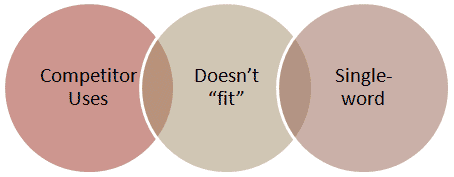Finding keywords is easy. Finding the right keywords, organizing them into optimizable groups, and determining where and how they get optimized into the site is another story all together. Generally, keyword research is done at the hands of the SEO. Taking those keywords and integrating them into the content is the job of the Copywriter.
Under most circumstances, you want defer to the person who has the strongest skills for each particular task. Let the SEO determine which keywords are best, and let the Copywriter work them into the page. But, when it comes to actually deciding which chosen keywords make it into any particular body of content, the Copywriter needs to have final say.

The SEO often chooses keywords based on things like popularity, importance, and ability to convert. All very important factors, and very likely the keywords that the site needs for optimization. But, sometimes keywords are chosen incorrectly. Sometimes the keyword selection process is circumvented by someone else. Perhaps a boss has a “pet” keyword they want to rank for because they said so. Don’t laugh, it happens.
One of the most common ways to choose a keyword incorrectly is based on competitor usage. While you may want to analyze your competition to see what keywords they are targeting as part of their SEO efforts, you don’t want to automatically use a phrase or keyword that they did, just because they did.
I’ve seen this time and time again. A client says, “We need to rank for “x” because my competitor is.” A little research will show that this particular phrase gets little to no search volume, but none of that matters to the client. Getting good rankings for that keyword may work, but there may be others that would work better. So, is it worth taking the focus off of other keywords that are likely to be more effective to focus on others just because a competitor is using them? The answer is no, it’s not.

Choosing single-word terms is tempting due to the search volume those terms have. Clients often choose these words on that basis alone. Single-word terms are not only difficult to rank for, they generally produce very poor conversions as well. Still, they are tempting targets for business owners who see dollar signs in every potential visit. But, instead of creating dollars, these keywords steal profits away through efforts that are better invested in other places.
I mentioned above that the ultimate decision of a keyword being worked into the page should be that of the Copywriter. Sometimes a keyword can hit all the right criteria, but when it comes to actually working it into the content, it simply doesn’t work. This can be for any number of issues, such as it containing a poor qualifier (which depicts a benefit that isn’t offered), or it’s simply an industry term that just isn’t a match for the rest of the user-focused content.
The Copywriter’s job isn’t to force every keyword given to them into the page. Their job is to make sure the keywords they are given do work and to leave out those that don’t.
The Copywriter might have to do some research of their own, looking at the products, features, benefits, term definitions, etc. If, when all is said and done, the keyword doesn’t work on a page, it needs to be deconsidered. (Ooh, new word… I like it!) The Copywriter may have to pull rank and tell the SEO and/or the site owner what’s what.
The key here is that the keyword research process doesn’t end with the SEO. It needs to continue all the way through to the copywriting process. Don’t let the keyword selection and optimization process be derailed by people picking keywords for all the wrong reasons. Make sure all of your targeted terms work on all levels before demanding they get used on the page.

One Response to Who Told You THAT Was a Good Keyword?